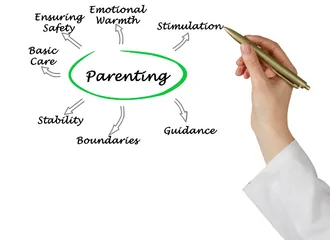How Do I Prove I am a Better Parent in Court?

You can prove to the courts that you are a parent who acts in the best interests of the child by establishing that:
- You can provide the child with ideal living conditions.
- You are attentive to the child’s needs and preferences.
- You are fair to the other parent.
- You are physically and mentally fit to take care of the child.
- You have witness testimonies that confirm that you are an ideal parent.
Proving that You can Provide the Child with Ideal Living Conditions
Equip yourself with documents that show that:
- You earn adequate income to manage the house and take care of the child. Demonstrate to the courts that you and the child will be financially secure, and have adequate money for necessities, schooling, utilities, health insurance, and other comforts.
- You have a house in which there is sufficient and wholesome space for the child. Inform the courts where the family will live after the divorce, how comfortable the inside of the home is, which bedroom goes to the child, the bathroom arrangements (sharing/exclusive), the neighborhood crime statistics, etc. Demonstrate that the house is ideal for the child and that the child will get adequate space that he/she desperately needs after the parents’ separation.
- You have always been there for the child and contributed to the child’s upbringing and emotional wellbeing (a journal detailing your contribution, monetary and non-monetary, can help you prove that you have not neglected the child).
- You can provide the child with a stable, safe, and secure environment, and parent him/her perfectly after the divorce.
Proving that You Are Attentive to the Child’s Needs and Preferences
If you are asked the following questions, are you in a position to answer them?
- Name the child’s doctor and dentist, and where their clinics are?
- When was the child last taken to the doctor/dentist?
- What treatment did the child receive?
- Does the child have any allergies or illnesses?
- Is the child under treatment for any medical condition?
- What was the last time the child was vaccinated, and for what?
- When is the next appointment with the doctor/dentist?
- What are the child’s teachers’ names?
- How often do you help the child with his homework?
- What does the child study at school?
- Which is your child’s favorite subject in school?
- What games does the child enjoy playing?
- How is the kid taken to, and picked up from school?
- What is the child’s normal bedtime?
- What does the child usually have for breakfast?
- What is the child’s clothing/shoe size?
Do you know the answer to these? Well, if you are deeply involved in the child’s upbringing, these answers will be on the tip of your tongue. If you can demonstrate to the courts that you know the child well, have been involved in his upbringing, and can take care of him, you will be at an advantage with the courts. You may also consider taking a parenting class to sharpen your knowledge.
Proving that You are Fair to the Other Parent
Many parents may file for child custody hoping they get sole custody. They may want to prove to the courts that the other parent is unfit to take care of the child. However, downplaying the other parent’s abilities could be a huge mistake unless, of course, the other parent is truly unfit to take care of the child. You need to put your ego or animosity aside and be fair to the other parent, especially if he/she can take care of the child.
Many judges rule in favor of joint or 50/50 custody arrangements because, ideally, they want both parents to contribute to the child’s future. The courts just want to establish who the better parent is so that they can grant primary custody to that parent. By badmouthing the other parent, you may end up being viewed in a negative light. Instead, demonstrate to the courts that you are happy and willing to work with the other parent on a parenting plan.
If the other parent just cannot care for the child, then you should submit records that prove his/her parenting or marital misdemeanors (addictions, abuse, vices, etc.) and state that he is an unfit parent.
Proving that You are Physically and Mentally Fit to Take Care of the Child
Aside from proving that you are financially secure to provide for the child’s needs, you should also prove with evidence that:
- You are not a substance abuser, nor are you addicted to vices like gambling or pornography.
- You are physically and mentally fit and stable.
- The child will not be at risk of any abandonment or neglect when he/she is with you (your parenting record can provide sufficient evidence).
- You do not have a criminal history.
Substantiate your evidence with photographs, videos, medical records, and any other documents that can be verified by the courts. Remember that the courts know that parents behave their best and are polite in the courts – so your behavior in the courts does not reflect on your parenting skills.
Witness Testimonies That Say You are an Ideal Parent
First-person witness accounts, especially from people who are directly connected to the child (teachers, for example) that state you are an ideal parent also may help you prove in the courts that you are a better parent.
